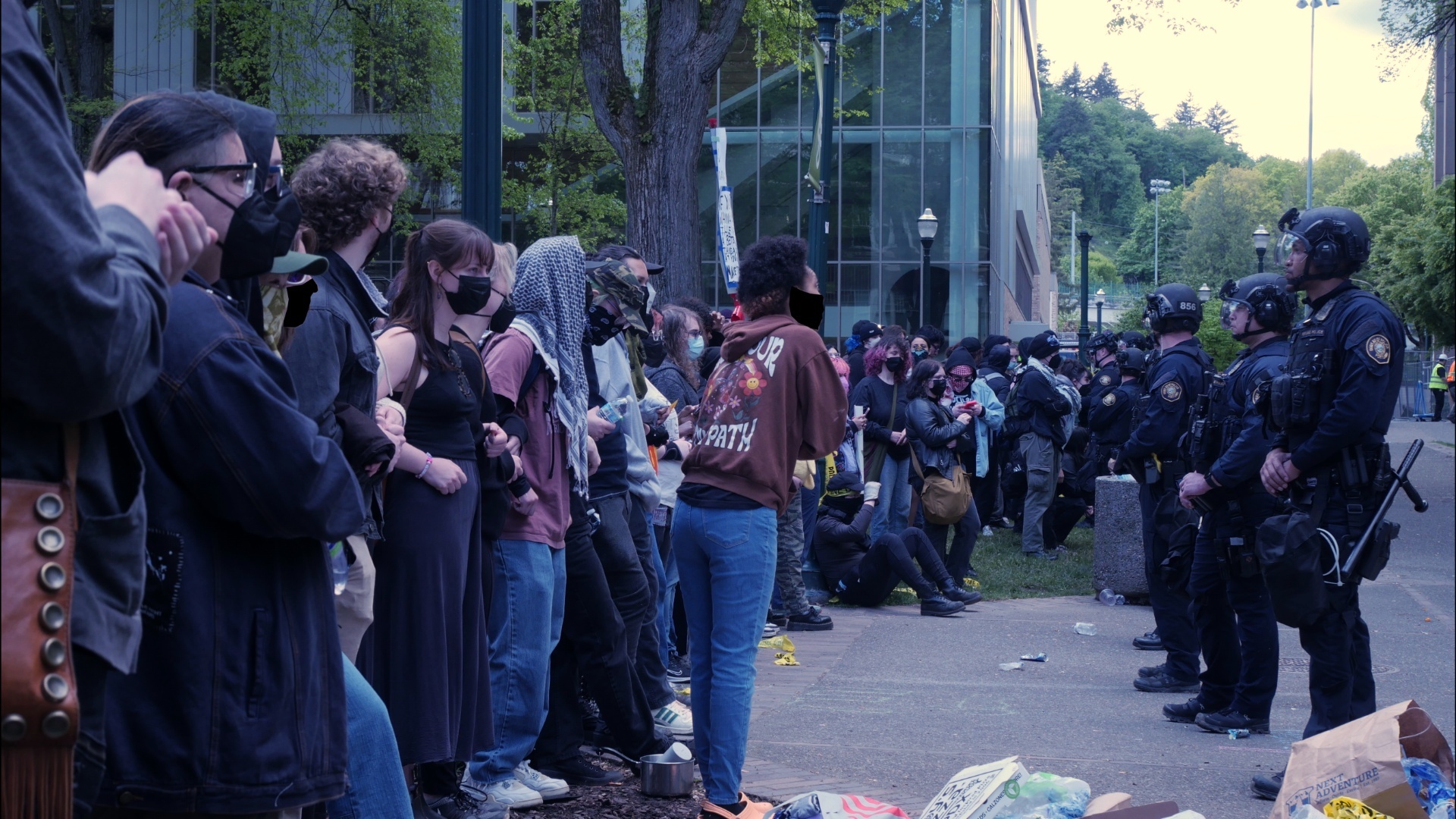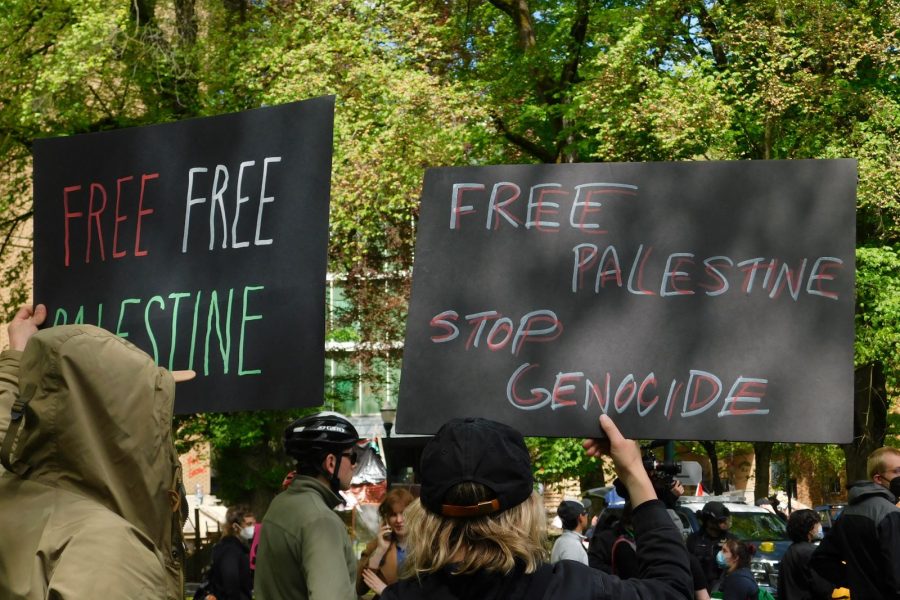One day you’re sitting at the park blocks with your friends, the next your face is on a promotional brochure for the university. Welcome to the life of a student of color at Portland State, the city’s leading university in diversity and neglectful administration.
Do I sound bitter? Yeah, I am. Rightfully so. First and foremost, PSU’s efforts to be inclusive to communities of color are extremely lazy and have shortcomings. They only put students of color at the forefront when it’s time to ask for funding and sell to our most vulnerable populations. The most PSU gives Black students and students of color is a random couch in a random building which is then labeled as a cultural resource center.
When you do get a building, you’re as invisible as possible.
I mean, what are the optics of placing the Native American Cultural Resource Center (NASCC) way in the back of the school? This center received a bomb threat, and the most PSU did was send a vague, lousy email. Although the bomb threat has since been confirmed a hoax, the trauma inflicted upon the community was very real and absolutely could’ve been handled better by the university. In the end, the community had each other and supported themselves.
PSU has a whole justice system referred to as Student Conduct which promises its focus is the success of students, when really its goal is to criminalize students—particularly Black students.
Student Conduct has personally told me that I must keep my interactions with other students peaceful after I had an off-campus conflict with an older student. While I won’t get into the finer details of things, the student started the conflict, and when they couldn’t finish they weaponized the PSU Student Conduct system by falsely claiming that I’d threatened their life. Yet, somehow the responsibility to remain cordial was placed on me, a dark-skinned Black femme. As if I’m not an adult who is bound to encounter conflict.
The entirety of the Student Conduct system is racialized and mimics the injustice system we see Black and brown folks fall under. It deems any conflict involving a Black or brown student as violent by the administration, even when that student is the victim. We talk about the school-to-prison pipeline in elementary and high schools, however, it’s time we discussed how the pipeline continues to follow Black students well into college. PSU’s Student Conduct system strongly replicates the country’s corrupt justice system which is embedded in other institutions.
The limitations of free speech—especially against Black students—and threats of disciplinary probation and consequences are just another leg on the school-to-prison pipeline, and over-policing that doesn’t stop even after Black students graduate. I wonder if I’ll receive a conduct letter for this article?
Then there are the limitations on free speech. Back in February, PSU ranked among the lowest for free speech, coming in 232 out of 248 schools. I’m not surprised, actually.
One anonymous student who’d been placed on behavioral probation for attending a protest at a Board of Trustees meeting explained to me how disheartened they’d felt to be punished for exercising their right to protest. “PSU administration, in their policing of the student body, tore away my hope for the future and the joy I felt fighting for a free Palestine,” the student said. “I would like to ask PSU, and their fellow friends in power in the war machine destroying humanity around us, how would you like us to protest? Should we sit silently and beg for our money to stop being a part of the industrialization of war? What has that ever given us in this university?”
It’s a question PSU still has yet to answer, with organizations such as Disarm PSU and Cut Ties with Boeing—benign political campaigns which have been vocal for years—having yet to realize their objectives. How do we achieve anything on campus when all effective forms of protesting are essentially criminalized and muzzled by police force?
For a school which brags about becoming the region’s model majority BIPOC institution, the talk sure doesn’t match the actions, and it’s evident in the campus-wide budget cuts. Why is it that the school of business remains continuously funded yet social sciences, such as Black and gender studies, face budget cuts?
Thank you, PSU. Thanks for determining social sciences as less valuable than businesses or anything else which funnels money through exploitation and weapons companies.
Pre- and post-library occupation protestors on this campus have practiced their freedom of speech and been met with police presence. PSU President Ann Cudd has consistently intruded on freedom of speech by deploying the Portland Police Bureau (PPB).
What does it say about a school’s president and administration if they have police on speed dial? Is this a place where one would expect students to feel safe?
To continue on the encampment at the Branford P. Millar Library, I truly can’t help but feel admiration and inspiration for the protestors. They bravely put their bodies on the line in the name of a free Palestine and called on PSU to divest from Boeing. For years, PSU has dragged out the process until student activists graduate and leave the university.
When they escaped the library and avoided arrest—for the most part—I was filled with joy and hope for the resistance. No one should be punished for practicing their right to protest. Protesting shouldn’t need permission to operate. Permission from the system doesn’t evoke change, people.
I imagine it’s difficult to operate as a student while knowing your school accepts blood money from the same companies that create military-grade weapons to commit genocide upon your own people. It’s disheartening when your very own president refuses to simply call for divestment and cut ties with companies funding the genocide.
Rather than viewing the genocide of Palestinians as a conflict, Cudd must acknowledge it for what it is—a genocide perpetrated by the illegitimate state of Israel and funded by United States dollars.
In response to the encampment, Cudd initiated a violent raid by the PPB who brought along Oregon state troopers to our campus—a place where we’re supposed to feel most safe and protected. As a school which positions itself as a safe, welcoming environment for Black and brown students, it’s deeply irresponsible to unleash law enforcement upon students, especially seeing as how police have already murdered 100 Black people this year alone.
During the protest, what I witnessed was beyond atrocious. The only thing more distasteful than the cops’ presence—as if anything could precede that—was knowing it was our university’s president who had allowed this to happen. Who had allowed for a Black man to be assaulted by the police, who had allowed a person in a wheelchair to be dragged from their chair multiple times.
Despite the fear I felt throughout my body while witnessing the police brutalize fellow students, hope also filled my heart. In the midst of all the violence, the community had mobilized with a common goal and took steps to protect each other. When I returned to class, my professors held space to discuss what had occurred the previous week. It felt right to have discussions surrounding police violence, and walking through trauma together as a community.
Even after the protests, the unity within the community and solidarity for the library protestors remained strong. Multiple PSU organizations and clubs released statements in support of the students demanding a divestment from Boeing, and condemned Cudd’s decision to allow police forces onto campus.
NASCC said it best on their Instagram post. “The trauma and distrust that was sowed will live on in students’ minds for an indeterminate amount of time,” the post stated. Seeing the history with police on campus and demands to #disarmpsu, I wonder if Cudd’s priorities lie in protecting students or protecting her pockets.
The PSU Alert system exists to provide immediate information to the community on anything that could compromise our safety. However, throughout the week of protests, PSU used the alert system to send a series of alerts which lacked transparency. They were overall dishonest. At one point, they claimed that the PPB would be on campus when there was in fact no police activity. A system meant to protect the community from harm was instead used to instill fear and paint a negative image against the library protestors.
Claiming the police are present on campus when there are no police at all is frankly disgusting. How are we supposed to trust the emergency alert system ever again knowing it was—and continues to be—abused and deceptively used as a tool to restrict students’ free speech on campus by disrupting protest actions?
While we discuss disparities within class systems, we should bring light to our president’s whopping salary of $610,000 on top of a $96,000 housing allowance and $12,000 for vehicle expenses. There’s something to be said when a university’s president makes upwards of $700,000 while knowing a few of my classmates live in their cars to survive.
Cudd’s inability to effectively negotiate with students alongside her unwillingness to divest from genocide has resulted in nothing but harm for the student body. Her attitude towards her student population is one of fear and not empathy. It’s becoming increasingly clear that Cudd’s actions jeopardize the continuation of PSU. After harsh budget cuts and the expansion of a police campus, it’s evident that her presence is more of a danger to students, and for this, we should say no more.
Between restrictions on campus freedoms, violent police occupation of campus, department cuts and a frankly insultingly exorbitant salary for an unresponsive, insufficient leader, it’s clear to these students where Cudd’s presidency is taking the university as an institution: towards failure.
I happen to agree with them.





